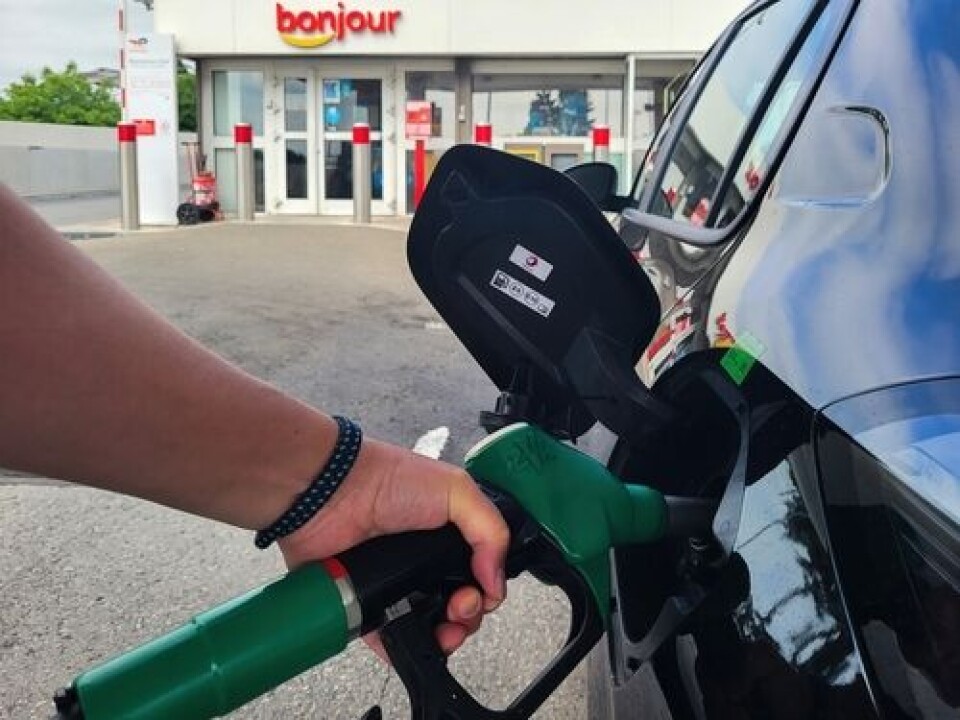-
New Paris-Jersey direct flight to launch this summer
Loganair route forms part of Channel Island’s tourism boost plan
-
Death of right-wing protester in Lyon sparks fears of further political violence
Quentin D, 23, died after reportedly being ambushed by far-left activists near site of political conference
-
Red flood alerts continue in south-west - and more heavy rain expected
Garonne river is particularly affected. French weekly weather forecast February 16 - 20
French fuel shortages: jerry cans to be banned to prevent stockpiling
Prime Minister Élisabeth Borne vows that the country will not be ‘blocked’ as fuel shortages continue and sales are restricted

[Update October 11 at 15:30 - Prime Minister Élisabeth Borne has announced that some Esso-ExxonMobil will be required to return to work so that a minimum service can operate.]
As France’s fuel shortages continue, prefectures are to be ordered to prohibit the use of jerry cans and other containers at petrol stations in a bid to avoid people stockpiling fuel.
Local authorities in Meuse, Yvelines, Eure-et-Loir, Seine-Saint-Denis, Vaucluse, Vosges, Val-d'Oise, Pas-de-Calais, Nord and Somme have already had a restrictive order for jerry cans in place, but the new order from the government will be nationwide.
This will mean that prefectures will be required by the government to pass decrees temporarily banning stockpiling through the use of jerry cans and other receptacles, with one minister describing it as a “national order implemented locally”.
The shortages have been caused by strikes at French TotalEnergies and Esso-ExxonMobil refineries, which have been ongoing since September 27. The strikes are continuing today as nearly one third of the country’s fuel stations report supply shortages.
Read more: Fuel shortages: strike action is renewed at French refineries
Emergency meeting last night
French Prime Minister Élisabeth Borne reportedly said at an emergency meeting yesterday evening that the government “cannot let the country be blocked”.
"It will continue to take measures to facilitate the supply of petrol stations as it has been doing for several days but everyone must take responsibility. The government will take its own,” she said.
There is talk that the government is considering requisitioning refinery employees. The word requisition (les réquisitions, in French) means in this context the government demanding that a certain number of the people striking return to work to ensure that a minimum service is provided.
The government cannot order all workers back to work as this would infringe on their right to strike.
A requisition is considered a controversial move in France with workers’ right to strike held in high esteem and the requisition seen as a moral infringement on this, if not a legal one.
‘We will do what is necessary’
French government spokesman Olivier Véran called for “all blockades to be lifted without delay” in an interview on RTL this morning (October 11).
“Otherwise, we will do what is necessary to lift them,” he said.
No official decision has been made on what the government might do. For the past few days, to help alleviate the situation, it has been using the state’s strategic oil reserves to supply stations.
Read more: French fuel shortages worsen: what is outlook for the week ahead?
Priority to caregivers?
Meanwhile, priority access to fuel for caregivers, on presentation of a professional card - is also being called for. A spokesperson for the National Federation of Nurses (FNI) explained their fears: “without emergency measures, the continuity of home care for many French people will be threatened, with the consequence of an increase in hospitalisations.”
Many other professions such as firefighters, artisans, taxi drivers, and school bus drivers are also looking for priority.
According to the latest government figures, nearly a third of gas stations are having supply problems. But there are contrasting situations across the country. Some of the worst affected areas are Hauts-de-France (54.8%), Pas-de-Calais (59.1%) and Ile-de-France (44.9%).
Three TotalEnergies refineries are completely at a standstill: in Normandy, in Feyzin (Rhône) and La Mède (Bouches-du-Rhône) as well as a fuel depot near Dunkirk (North).
About 15 motorway petrol stations in the Argedis chain – a subsidiary of TotalEnergies – are also now affected by the strike.
The CGT is looking for a 10% pay rise for its members.
Light at the end of the tunnel?
Meanwhile at oil giant EssoMobil there could be light at the end of the tunnel. Two majority unions, CFDT and CFE-CGC have voted an agreement with the management for a wage increase of 6.5% in 2023 and a bonus of €3,000.
Read more: Fuel shortages: strike action is renewed at French refineries
But the strikes were renewed because no agreement was reached with the CGT and FO.
To add to the misery, fuel prices jumped last week with diesel, lead-free 95-E10 and lead-free 95 all on the rise.
Related articles
French fuel shortages worsen: what is outlook for the week ahead?
French fuel shortage: How to check stocks at your local petrol station
























